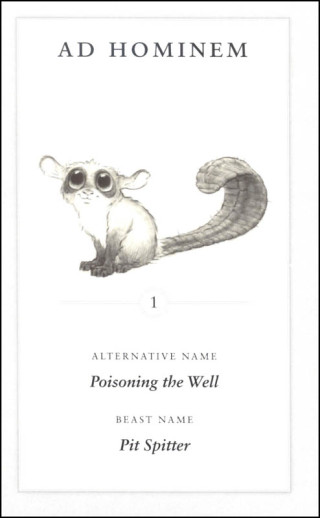We use cookies to make your experience better. To comply with the new e-Privacy directive, we need to ask for your consent to set the cookies. Learn more.
Adorable Fallacies Student Flashcards
Also available are 50 double sided flashcards aligned to the fallacies in the text. Black and white illustration and fallacy name are one side with the fallacy example on the flip side. Cardstock flashcards measure 3.4" x 5.5".
Each set includes all fifty fallacy flashcards from The Amazing Doctor Ransom's Bestiary of Adorable Fallacies. Test yourself on fallacy descriptions_1 and all fallacy names (not to mention the ever-captivating beast titles and characteristics). Each flashcard is entertainingly illustrated with each fallacy in harmless mode on one side and attack mode on the other. Get the practice you need to identify the little stinkers wherever they might appear.
Flashcards are printed on 3.4" x 5.5" cardstock.
Adorable fallacies? I suspect that is new terminology for logic-minded readers. But it is a term I appreciate. Personally, I find that trying to exert reason into a discussion filled with fallacy leads to great frustration. Combining a working knowledge of the fallacy with a light-hearted perspective and animal theme, authors Doug and N.D. Wilson provide a vital resource for anyone wanting to apply logic into their everyday discussions.
Divided into four kingdoms, the authors teach through 50 informal fallacies. Kingdom I: Fallacies of Distractions includes Ad Hominem, Genetic Fallacy, Special Pleading, Straw Man, Red Herring and others; Kingdom II: Fallacies of Ambiguity includes Equivocation (Definitional Ambiguity), Division (Whole to Part Fallacy), Loaded (or Complex) Question plus many others; Kingdom III: Fallacies of Form includes Petitio Princippi (Circular Reasoning), Denying the Antecedent, Fallacy of Compromise (Argument to Moderation), Naturalistic fallacy (Is-Ought fallacy), Slippery Slope and others; Kingdom IV: Millennial Fallacies include Milquetoastery (appeal to consequences), Ad Imperium (there ought to be a law'), Hyperlogicism and other contemporary rationales.
Chapters conclude with discussion questions and exercises. In the back of the book is a brief answer key along with a one semester or one year reading schedule. The publisher Canon Press offers free quizzes/tests (and answers). We have these available for download on our website. Also available are 50 double sided flashcards aligned to the fallacies in the text. Black and white illustration and fallacy name are one side with the fallacy example on the flip side. Cardstock Flashcards measure 3.4" x 5.5".
Worth mentioning, there is edginess to this resource not found in similar resources. Presumably, this is to provide more real- life application. Many examples would be considered contrary to Christian beliefs including drugs, abortion, pot smoking, and one instance where the Bible is referenced as a "dusty holy book" 320 pgs. SC. ~ Deanne
| Product Format: | Other |
|---|---|
| Brand: | Logos School Materials |
| Grades: | 9-AD |
| ISBN: | 9781957905181 |
| Length in Inches: | 5.5 |
| Width in Inches: | 3.375 |
| Height in Inches: | 0.5625 |
| Weight in Pounds: | 0.35 |

